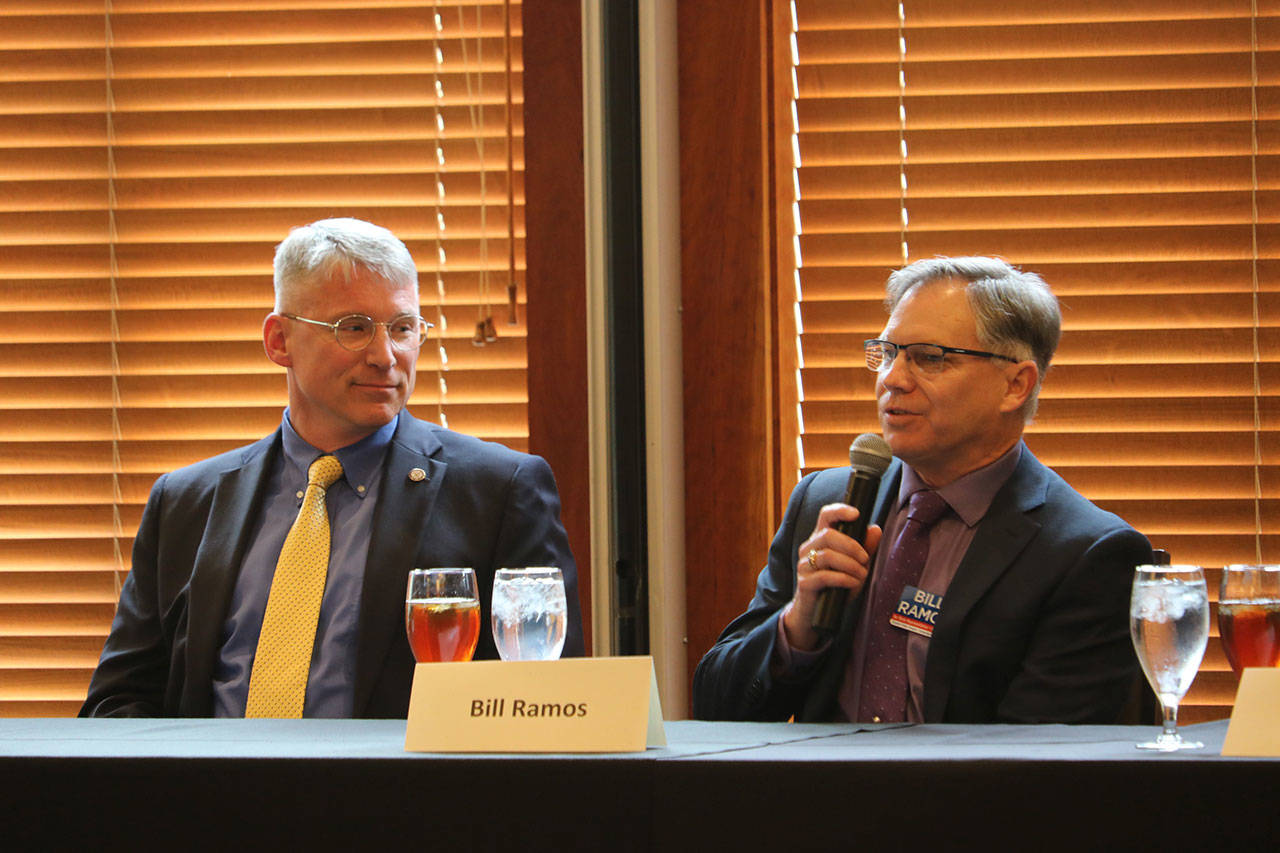Candidates for both positions in the 5th Legislative District attended the Snoqualmie Valley Chamber of Commerce Luncheon and Candidate Forum on Oct. 24.
Position one state representative candidates Republican Chad Magendanz and Democrat Bill Ramos, and position two state representative candidates Republican incumbent Rep. Paul Graves and Democrat Lisa Callan were in attendance. The 5th Legislative District covers the area from Issaquah all the way east to Kittitas County.
The forum was moderated by Snoqualmie Valley School District Superintendent Rob Manahan, who led the candidates through a discussion on specific questions regarding issues they will face as representatives of the the district.
When asked if they supported a capital gains tax or an income tax, both Magendanz and Ramos said they did not. Ramos said he did not support the tax at this time, but wanted to look for more progressive tax structures. Magendanz said the state’s tax structure was hard to maintain and income taxes are volatile taxation methods that could result in inconsistent swings in funding per year for state funding for education.
Callan spoke about waiting to work through the next biennial budget for the state Legislature to see where they stand in terms of taxes and funding, so she was not supportive of the tax at that moment either. Graves also opposed the idea and noted the state has $800 million in extra dollars, more than it though it was going to have this year, which he said was a reminder that the best form of tax revenue is a good economy.
Manahan also asked the candidates about their thoughts on a carbon tax and Initiative 1631. Magendanz does not support a carbon tax because he believes the state already has effective mechanisms in place such as the gas tax, which has a much lower overhead cost. Ramos said he was concerned that a carbon tax would unfairly impact the people lowest on the economic spectrum, but did support I-1631 after much research on the initiative.
Callan also supports I-1631, saying the initiative would be an important step to meet environmental goals set by legislation. Much like Ramos, she also wanted to make sure the carbon taxes were implemented equitably so lower income citizens were not unfairly charged. Graves opposes the initiative because of the several exemptions made for things like jet fuel. He also criticized the initiative for having the money collected be administered by a 15-member, unelected board.
On the topic of education funding, all four candidates agreed that while progress had been made, more work still needs to be done. Ramos noted a number of elements missing from the school funding that still needs to be resolved, such as funding for special education programs, counselors in schools, and programs to develop skills in technology. Making sure the tax burden for these funds was spread equitably through society was a big point for Ramos as well.
Magendanz cited his role as one of the lead negotiators of the McCleary Act, and said the focus should be on how the new funding from McCleary is being spent to maximize student achievement. He also cited many of the programs that still need funding, such as early learning, tech education, and counseling.
Graves agreed, and commended the Snoqualmie Valley School District for their pilot programs in connecting students with local businesses so they can see what kinds of jobs are available and what pathways current employees took to find those jobs. Callan also touched on the importance of mental health resources, special education and early learning. Many of the programs and staff that don’t fall under basic education and instead would be classified as enrichment are also important to student success, she said.
The candidates also touched on the regional need for more affordable housing. Magendanz, like the rest of the candidates, recognizes the ongoing issue of people not being able to afford to live where they work. He suggests changes to policy that would allow developers more flexibility in the types of affordable housing, such as buildings with shared kitchen and bathroom spaces. Ramos cited his work on the Issaquah City Council working through a development moratorium to get more affordable housing options in the city. He supports continued work with developers to promote housing at all pricing levels.
Callan also talked about working with cities to make sure they are able to make positive changes to add less expensive housing options, she specifically suggests pricing tied to the cost of living in the region in order to match specific needs of differing communities. Graves said more supply is needed and suggests allowing changes to tax credit offers to support more affordable housing from developers.
Washington State voting ballots have been mailed to registered voters across the state. Ballots should be postmarked or returned to a ballot drop box by 8 p.m. on Nov. 6.


